The Nitto Group has identified “realizing a decarbonized society” as one of its key sustainability issues. We recognize that reducing greenhouse gas (GHG) emissions—the primary cause of climate change—is essential for building a sustainable society and achieving corporate growth. We consider this an important social responsibility.
Environmental and social changes brought about by climate change also pose major future risks to corporate management. Therefore, the Nitto Group is committed to achieving carbon neutrality by 2050 and is working to gradually reduce its use of fossil fuels.
Specifically, we are introducing renewable energy sources and promoting energy-saving measures in our facilities to improve energy efficiency. Through these efforts, we are steadily reducing our dependence on fossil fuels.
To improve the feasibility of our climate change initiatives, we have established a Global Green Committee, headed by the Director in Charge of the Environment, to strengthen cross-organizational collaboration not only with related functional departments, such as the department responsible for promoting ESG management overall and procurement departments, but also with business execution departments and area headquarters. Please see the TCFD page for details.
GGC Initiative Structure
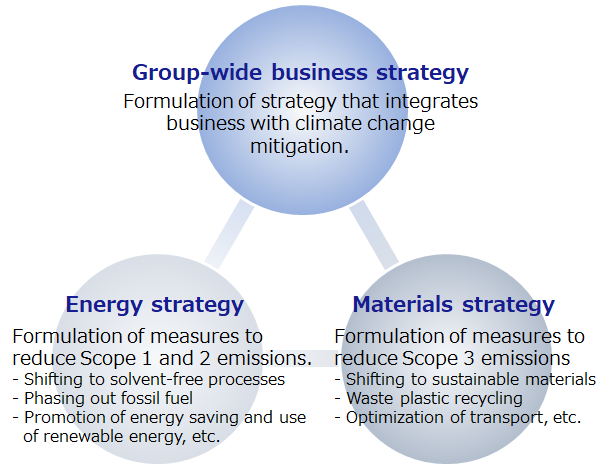 |
The Nitto Group has declared itself carbon neutral in 2022, aiming to reduce GHG (CO2) emissions to 400,000 tons by 2030 (a 46.3% reduction compared to 2020), and to achieve virtually zero GHG (CO2) emissions (Scope 1+2) by 2050. To achieve this target, we will work to convert to solvent-free manufacturing methods, make effective use of energy (energy conservation), switch to renewable energy, and create environmentally friendly products (PlanetFlags) in order to minimize risks and maximize opportunities. Furthermore, with a view to achieving carbon neutrality (Scope 1+2) by 2050, we are strengthening our Scope 1 measures and are also taking on the challenge of establishing technologies to utilize H2 (hydrogen) and capture CO2.
Regarding the use of renewable energy, we have joined Renewable Energy 100% (RE100) and have set a global target of 100% by 2035. As a supply shortage of renewable energy electricity is predicted in the future, we will work to accelerate social implementation and ensure stable procurement from a long-term perspective.
We have formulated and are implementing an investment plan of 80 billion yen over the 10 years starting from 2021 for initiatives such as improving facility operation, saving energy by updating to high-efficiency equipment, and increasing the use of renewable energy by newly installing and expanding solar power generation facilities.
To achieve carbon neutrality throughout society, it is necessary to manage and reduce GHG (CO2) emissions (Scope 3) not only within one's own company but throughout the entire supply chain. We are promoting reduction activities with the target of reducing GHG (CO2) emissions to 1.46 million tons by 2030 (a 25% reduction compared to 2022).
GHG(CO2)Emissions Target
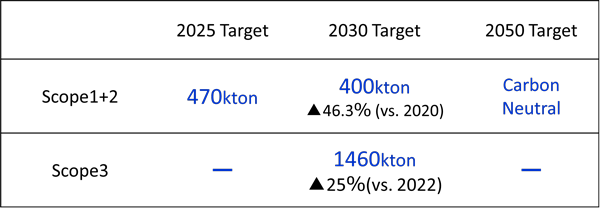 |
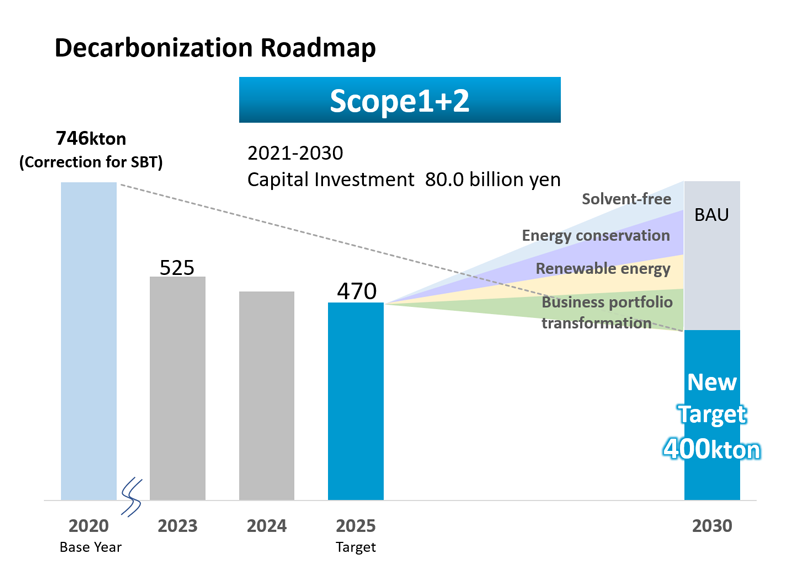 |
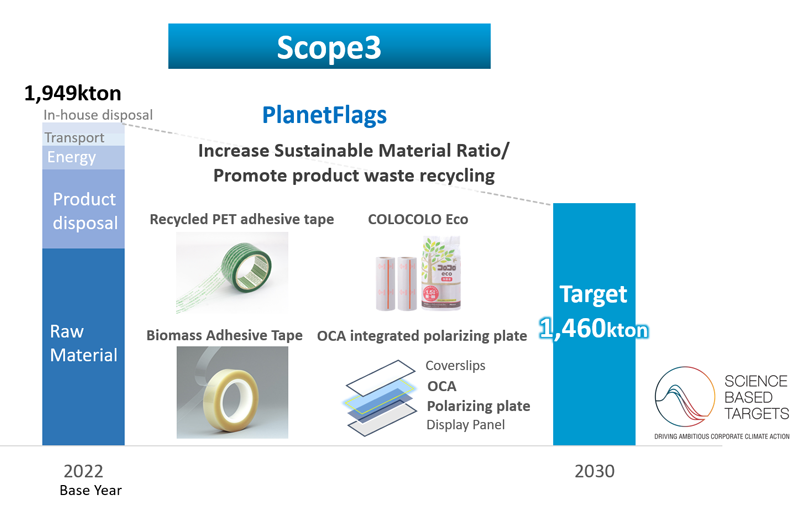 |
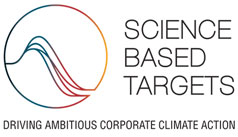 |
Science Based Targets (SBT)Nitto Denko Corporation has received certification from the international initiative "Science Based Targets" for its greenhouse gas (GHG) emissions targets for 2030, which are based on science.
|
 |
RE100In order to reduce our own CO2 emissions through renewable energy and promote the implementation of renewable energy throughout society, we joined Renewable Energy 100% (RE100) on May 23, 2024, which aims to convert the electricity used in our business activities to 100% renewable energy. We aim to achieve 100% globally by 2035. |
With the help of new technology, we are promoting the conversion of solvent-based products, which require a lot of energy for drying and recovery processes, to solvent-free products and the reduction of our use of organic solvents.
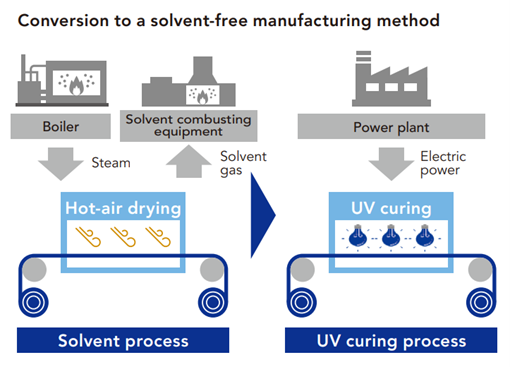 |
We have created energy-saving standard specifications and are promoting energy-saving initiatives in our manufacturing processes globally.
We are also proactively investing in energy-saving air conditioning in clean rooms and switching to LED lighting, promoting energy conservation in our manufacturing processes, and electrifying them (eliminating the use of fossil fuels).
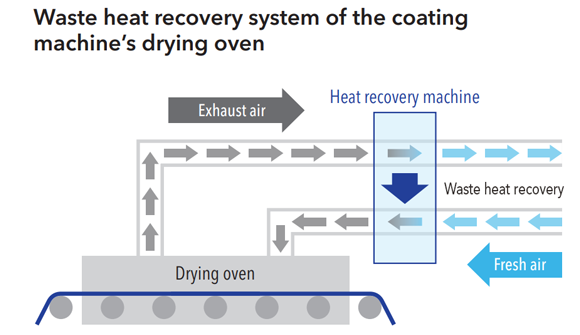 |
In order to reduce our own GHG (CO2) emissions through renewable energy and promote the implementation of renewable energy throughout society, we are working to convert the electricity used in our business activities to renewable energy.
As a supply shortage of renewable power is expected in the future, we will actively utilize Power Purchase Agreements (PPAs) to help accelerate social implementation. We aim to procure a stable supply of renewable power.
*Please refer to the Sustainability Data Book for conversion rates.
Since 2005, the Nitto Group has been proactively introducing solar power generation system for in-house power generation.
*Please refer to the Sustainability Data Book for details such as solar power generation capacity.
Photo on the left: Solar panels installed on the roof (Nitto Denko Ibaraki Plant)
Photo on the right: Solar panels installed on a carport (Korea Nitto Optical Co., Ltd.)
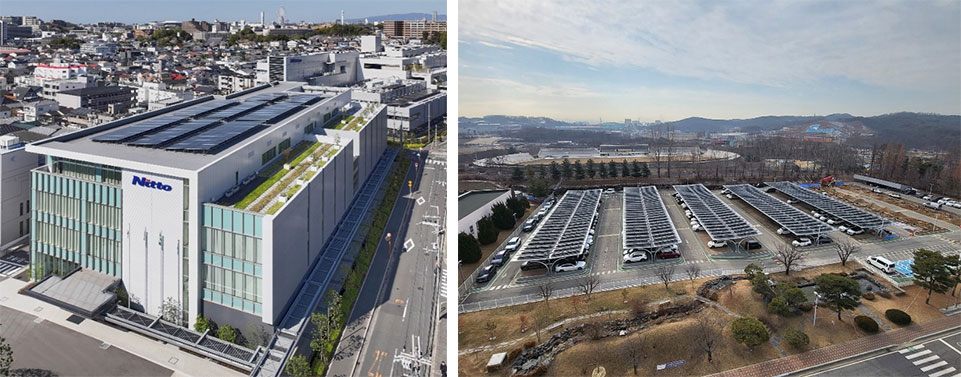 |
The Tohoku Office's CO2 Zero Emissions plant produces steam from H2 (hydrogen) produced by renewable electricity and solar power generation, as well as H2 (hydrogen) procured from outside, achieving zero CO2 emissions at the plant.
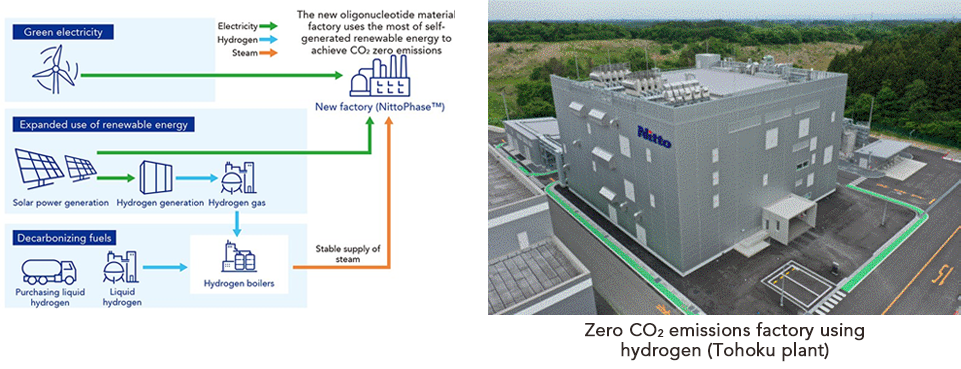 |
*Please refer to the news release for details.
In order to achieve carbon neutrality (Scope 1 + 2) by fiscal year 2050, we are accelerating the development of "negative emissions technology" to capture CO2, which is unavoidably emitted during the manufacturing process. We combine multiple negative emissions technologies, including CO2 separation, gas chemical conversion, and direct air capture, to propose this as a total solution for CO2 reduction.
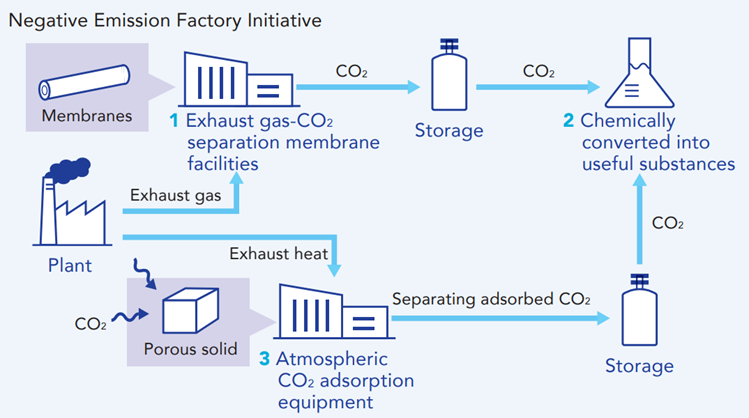 |
The Nitto Group visualizes the environmental contribution of the products and services it produces and certify products and services that make an especially large contribution as PlanetFlags, thereby realizing its initiatives to address key sustainability issues.
*For details, please refer to PlanetFlags/HumanFlags (products that contribute to the environment and humanity).
In Scope 3, the proportion of GHG (CO2) emissions derived from raw materials accounts for the largest proportion at 40%, and is an important issue for the Nitto Group to address. Additionally, we will continue to promote reduction activities focusing on in-house waste, transportation, and product disposal.
*Please refer to the Sustainability Data Book for details.